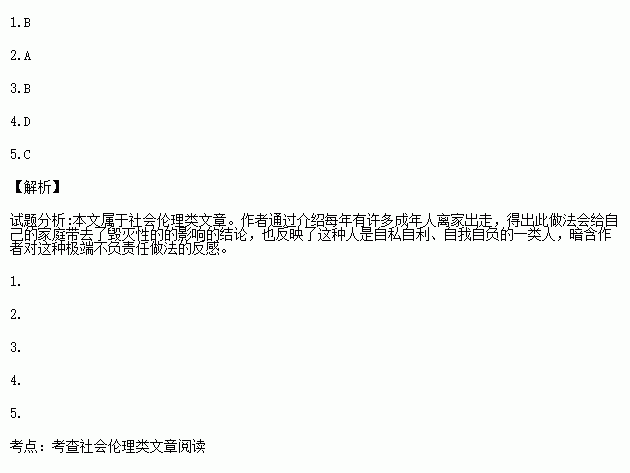题目内容
Sixteen years ago, Eileen Doyle’s husband, an engineer, took his four children up for an early morning cup of tea, packed a small case and was never seen or heard from again. Eileen was astonished and in a state of despair. They had been a happy family and, as far as she knew, there had been nothing wrong with their marriage.
Every day of the year a small group of men and women quietly pack a few belongings and, without so much as a note or a good-bye, close the front door for the last time, leaving their debts, their worries and their confused families behind them. Last year, more than 1,200 men and nearly as many women were reported missing from home — the highest in 15 years. Many did return home within a year, but others rejected the past completely and are now living a new life somewhere under a different identity.
To those left behind this form of desertion is a terrible blow to their pride and self-confidence. Even the finality of death might be preferable. At least it does not imply rejection or failure. Worse than that, people can be left with an unfinished marriage, not knowing whether they will have to wait seven years before they are free to start a fresh life.
Clinical psychologist Paul Brown believes most departures of this kind to be well planned rather than impulsive. “It’s typical of the kind of personality which seems able to ignore other people’s pain and difficulties. Running away, like killing yourself, is a highly aggressive act. By creating an absence the people left behind feel guilty, upset and empty.”
1.Eileen Doyle reacted that way after her husband’s leaving, because she__________.
A. failed to hear from him for a long time
B. had no idea what was wrong with their family life
C. blamed herself for something wrong she did
D. wondered why her husband took up all their children
2.According to the passage, those people left their families behind for the following reasons except_________.
A. they couldn’t bear their spouse (配偶)
B. they were afraid of the burden of debts
C. they wanted to forget the past completely
D. they wanted to start a new life somewhere else
3. The man or woman left behind with an unfinished marriage usually ________.
A. admits their responsibility for the situation
B. feels embarrassed and useless
C. will have no legal marriage life for seven years
D. wishes the person who has left were dead
4.Some people would even prefer the death to the running away of their spouse because ________.
A. their spouse would feel greatly relieved
B. their spouse would feel no pain during the death
C. their spouse’s death would contribute to them starting a fresh life
D. their spouse’s death would not bring a feeling of rejection or failure
5.What’s the author’s attitude towards the departures of this kind?
A. Objective. B. Supportive.
C. Negative. D. Positive.

